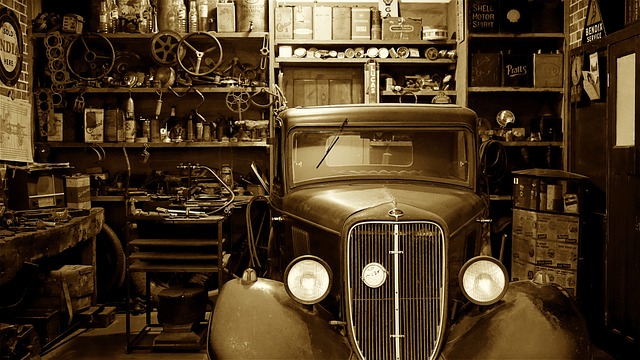A vehicle history report is a crucial tool for buying used cars, offering insights into accidents, repairs, and salvage status through insurance claims, maintenance records, and VIN checks. While free VIN checks provide basic info, paid services offer detailed reports on hidden damage, odometer tampering, recalls, and previous ownership, ensuring informed decisions, safety, and protection against fraud. Comprehensive reports help buyers avoid costly surprises, make transparent choices, and ensure trustworthy purchases.
Buying a car is an exciting journey, but it’s crucial to look beyond the shiny exterior. Recent trends reveal a surge in fraudulent practices in auto sales, with odometer tampering being one of the most common schemes, costing buyers thousands. To avoid such pitfalls, understanding vehicle history reports becomes essential. This comprehensive guide delves into the intricacies of car histories, exposing common scams and offering practical tips on conducting thorough Vehicle Identification Number (VIN) checks. By combining free and paid services, you can ensure transparency, uncover hidden issues, and make informed decisions when purchasing a used vehicle, safeguarding your investment.
- Understanding Vehicle History Reports
- Common Fraudulent Practices in Car Sales
- The Role of Odometer Tampering
- How to Conduct a Comprehensive VIN Check
- Free vs. Paid VIN Checking Services
- Uncovering Insurance Claims and Maintenance Records
- Protecting Your Investment: Tips for Buying a Used Car
Understanding Vehicle History Reports

A vehicle history report is like a medical record for cars, detailing its past and present condition. It provides insights into whether the car has been in accidents, major repairs, or even if it’s been branded as salvage—meaning it’s considered a total loss by insurance companies after sustaining significant damage. This report goes beyond what’s visible to the naked eye and includes information from various sources, such as insurance claims, maintenance records, and vehicle identification number (VIN) checks.
These reports are crucial tools for buyers to make informed decisions. They help avoid buying a car with hidden issues or fraudulent histories. By accessing this data, consumers can protect themselves from potential fraudsters who might tamper with odometers to increase a vehicle’s perceived value or hide accident records. Thus, a thorough check of a car’s history is as essential as inspecting its physical condition before sealing the deal.
Common Fraudulent Practices in Car Sales

The Role of Odometer Tampering

Odometer tampering is a fraudulent practice where the mileage on a vehicle’s odometer is illegally altered to appear lower than it actually is. This deceptive act has become increasingly common, primarily because used cars are often bought and sold quickly, leaving little time for thorough inspection. By manipulating the odometer, scammers can significantly increase the resale value of a car, as buyers tend to associate lower mileage with better condition and fewer issues. However, this practice poses a significant risk to unsuspecting consumers, who may end up paying a premium for a vehicle that has already sustained extensive damage or hidden mechanical problems due to its altered mileage.
This fraudulent behavior not only deceives buyers but also hampers the overall transparency in the auto market. Odometer tampering can lead to unsafe vehicles being sold, potentially causing accidents and injuries. It’s a serious issue that highlights the need for proactive measures by car buyers. A comprehensive vehicle history report, coupled with a reliable VIN check, becomes an essential tool in fighting such fraudulent practices, ensuring buyers make informed decisions and protecting their investments.
How to Conduct a Comprehensive VIN Check

Conducting a comprehensive Vehicle Identification Number (VIN) check is an essential step in ensuring you’re making an informed purchase when buying a used car. Start by obtaining the VIN from the vehicle’s registration documents or by checking the driver’s side door jamb, engine bay, or under the rear window. Then, use reputable online platforms that offer detailed VIN reports for a fee. These services will retrieve and display crucial information, including the vehicle’s history of ownership, major accidents, outstanding loans, recall notices, and maintenance records.
For the most accurate results, compare data from multiple sources. Free VIN checks often provide basic information but may overlook more detailed or recent updates. Investing in a comprehensive report ensures you uncover any potential red flags, such as odometer tampering or undisclosed damage, safeguarding your financial interests and ensuring a safer purchase.
Free vs. Paid VIN Checking Services

Free VIN checking services are readily available online, making it tempting to rely on them for a quick and easy check. However, these free tools often only scratch the surface. They might provide basic information like vehicle identification number (VIN), make, model, and year but typically fail to uncover crucial details such as accident history, insurance claims, or if the car has been branded as salvage. These free services rely on public databases that may not be updated in real-time or comprehensive enough to catch all fraudulent activities.
On the other hand, paid VIN checking services offer a more thorough investigation. They access deeper, industry-specific databases and employ advanced algorithms to deliver a detailed vehicle history report. These reports can include hidden damage, odometer tampering attempts, previous ownership details, maintenance records, and whether the car has been branded as salvage or had any safety recalls. While free services might give you some initial insights, investing in a paid service is the best way to ensure you’re making an informed decision when purchasing a pre-owned vehicle.
Uncovering Insurance Claims and Maintenance Records

A comprehensive vehicle history report delves into the car’s past, revealing crucial information beyond what’s visible on the surface. It uncovers detailed records of insurance claims, providing insight into any previous accidents or significant damage. This transparency is vital for buyers to assess potential risks and costs associated with repairs. Moreover, maintenance records offer a glimpse into the vehicle’s upkeep history, indicating whether routine services were performed and how well it has been cared for over time.
Accessing these records ensures that buyers aren’t caught off guard by hidden issues. An honest view of the car’s insurance claims history can prevent costly surprises post-purchase, while maintenance records highlight potential areas of concern or exceptional care, guiding informed decisions.
Protecting Your Investment: Tips for Buying a Used Car

Buying a used car can be an exciting yet cautious endeavor, especially with growing concerns about fraudulent practices in the auto industry. To protect your investment, it’s crucial to take proactive steps and conduct thorough research before making a purchase. One of the best ways to start is by obtaining a comprehensive vehicle history report using the car’s unique Vehicle Identification Number (VIN). This report provides invaluable insights into the car’s past, including any accidents, insurance claims, and maintenance records.
By comparing information from free VIN checks with paid services, buyers can gain a more accurate picture of a vehicle’s condition. Staying informed about potential red flags, such as odometer tampering or undisclosed damage, allows you to make informed decisions and negotiate prices effectively. Remember, knowing the car’s history is key to ensuring your safety, securing reliable transportation, and safeguarding your financial investment.
When buying a car, a comprehensive vehicle history report is your best defense against fraud and hidden problems. By combining free and paid services, you can access vital information about insurance claims, maintenance records, and even odometer tampering. Don’t let a seemingly perfect car turn into a costly mistake; take the time to investigate its past. Protecting your investment starts with knowledge, so approach car buying armed with the right tools and awareness of common fraudulent practices.



